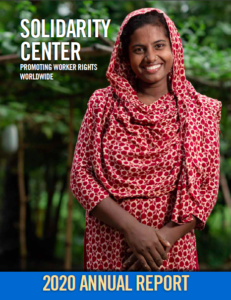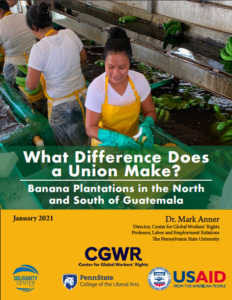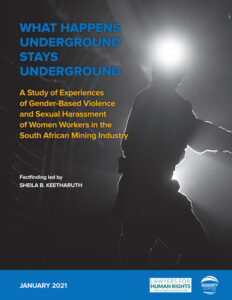 |
 |
 |
Jamie Davis, Solidarity Center Myanmar country director, discusses how unions, starting from scratch after decades of military rule, are organizing workers and making gains. “We need to make sure workers in Myanmar, as in any country, including the United States, have a voice.”
“Over the past three years, the Bangladesh government has approved fewer and fewer union registration applications. Through their unions, workers are able to speak out freely about safety and health concerns at their worksites and prevent horrible tragedies like Rana Plaza. Limiting workers from forming unions puts workers’ safety at risk,” said Tim Ryan, Solidarity Center director of Asia programs.
Imani Countess, the Africa regional program director for the Solidarity Center, said that workers should receive the rewards of their work—decent pay, benefits, safe working conditions, respect and fair treatment. “So when in 2013 we heard that over 100 women in Hwange peacefully protested—demanding that wages owed to their men be paid—and were met by police violence resulting in injuries for several, we were shocked.”
An astounding 80,000 Zimbabwe workers in formal employment–out of some 350,000 workers–did not receive wages and benefits on time in 2014, according to a new Solidarity Center report, ‘Working Without Pay: Wage Theft in Zimbabwe,’ released today in Harare.
Human rights lawyer Preeda Tongchumnum also lauded Thai government’s effort in tackling human trafficking but said more could be done, including ratifying the United Nations International Labor Organization convention. “Without these rights, migrant workers especially in Thailand’s biggest export industries remain vulnerable,” said Tongchumnum from the Solidarity Center office in Thailand.
“A credible and successful governance system would ensure that ALL workers (including migrant and informal economy workers) are covered by labor and other legal protections,” said Neha Misra, Solidarity Center Senior Specialist on Migration and Human Trafficking.
Solidarity Center Executive Director Shawna Bader-Blau was one of four representatives of the human and worker rights community at a meeting called by U.S. Sens. Sherrod Brown (D-OH) and Ron Wyden (D-OR) with members of the Administration and advocacy groups to press for strong enforcement of the senators’ amendment to end the importation of products produced with forced labor into the United States.
In the effort to end child labor and other abuses in supply chains, voluntary, unenforceable corporate codes of conduct are not the answer, write’s Solidarity Center Senior Asia Program Officer Sonia Mistry. “The only truly sustainable and meaningful alternatives to voluntary codes of conduct are binding and enforceable standards that employers and governments must abide by and which uphold the labor standards enshrined in the International Labor Organization’s (ILO) conventions, like the prohibition on child labor and the right of workers to form or join unions.”
As part of this project we held a focus group with ten Bangladeshi women migrant domestic workers in Jordan, together with our partners from Solidarity Center. (Op-Ed by Global Alliance Against Traffic in Women)
The human trafficking case against nine labor brokers and the owner of a Thai fishing company is now on trial and the Solidarity Center is pushing for the case to be moved. “‘We wanted to move the case [to Bangkok] because we are worried about the safety of the victims,’ said Preeda Tongchumnum, a lawyer who works with the Solidarity Center.